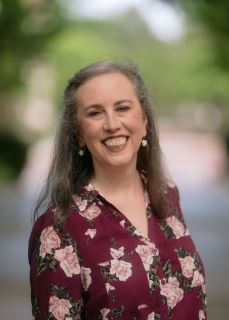We love building relationships. Subscribe to our blog to receive weekly encouragement in your email inbox.
Search Our Blog Posts
Blog Article Tags
Visit Our Store
Donate
You can also mail checks, made out to IRSM, to:
Iron Rose Sister Ministries
PO Box 1351
Searcy, AR 72145
IRSM is a 501(c)(3), so donations are tax-deductible.
Blog
More blog entries below
 Written by Michelle J. Goff, Founder and Executive Director of Iron Rose Sister Ministries
Written by Michelle J. Goff, Founder and Executive Director of Iron Rose Sister Ministries
Follow my example, as I follow the example of Christ. (1Co 11:1 NIV)
Immediately after college graduation, my parents and I caravaned me straight to Atlanta, Georgia, where I was going to work as an assistant to the Director of Missions, Bob Brown, longtime missionary in Venezuela. I had interned under him for a summer two years prior and had already begun to travel extensively with him and others to Venezuela, Colombia, Mexico, and even Kazakhstan.
I began to make many of those trips on my own, speaking at ladies’ conferences, supporting new church plants, serving through evangelistic campaigns, counseling at youth camps and teaching a class to the young women. Amongst the local Kingdom workers, I was known as Michelle “secretaria de Bob” (Bob’s secretary). The moniker became my last name or primary identifier.
After a year and a half working together in Atlanta, Bob and his family decided to accept the invitation of a small group in Denver, Colorado, to collaborate in a church plant in the southern part of the city (Highlands Ranch). Additionally, the goal was to establish a Spanish-speaking congregation in the area. Over 33% of the population was Hispanic, yet there were no churches of Christ in the entire metropolitan area.
I was invited to join the team that was forming to meet those Kingdom needs in Denver. But I was torn. I had also been invited to take over the job Bob would be vacating as Director of Missions. And at the same time, I was offered the opportunity for full support for 3-5 years during which I would serve as a missionary in Venezuela, in the city of my choice.
Aaaaahhhhh, what should I do?! You can imagine the sleepless nights of wrestling in prayer and indecision. I also sought wise counsel regarding this weighty decision that I felt would alter the course of my entire life.
Naturally, I asked my mentor and boss for his advice. One of my arguments for not going to Denver was that I didn’t want people to say that I was following Bob… “Oh, of course she moved to Denver. She’s just following Bob.” His response to my fear, “So what if they say you are following me? What’s the problem?”
“I shouldn’t follow a man! I should only, ever follow Christ!” (Yes, I know my rebuttal might’ve been different if I were married…)
“Go read 1 Corinthians 11:1.”
“I’ve read it, and I have a problem with it!” (A previous translation I was referencing mentally was “Follow me, as I follow Christ.”)
“Then I think you need to go meditate on that verse.”
“Ugh!”
I can recall that conversation and my level of frustration as if it had happened yesterday. What I also remember is the time that I did spend meditating on that verse. In my immature interpretation, I was focused on a frustration with following Paul or anyone that was not Christ Himself. Through prayer and meditation on 1 Corinthians 11:1, God revealed the importance of the 2nd phrase, “as I follow Christ.”
The Lord, through Paul, did not call us to follow others blindly, indiscriminately, or naively. God calls us to follow Christ and walk in His steps (1Pe 2:21). But God has also provided us imperfect examples, other Christ followers, from whom we can learn and grow.
If someone sins, I should not follow them into sin. Yet if someone shows repentance, turns from their sin, and follows Christ in their steps toward accepting the grace and mercy God offers, I should follow in their steps of repentance in whatever area that applies to me.
Follow me, as I follow Christ. “Follow my example, as I follow the example of Christ” (1Co 11:1). I pray that we can all say those words and declare ourselves faithful Christ followers who imperfectly navigate walking in the light as He is in the light (1Jn 1:7).
This is the message we have heard from him and declare to you: God is light; in him there is no darkness at all. If we claim to have fellowship with him and yet walk in the darkness, we lie and do not live out the truth. But if we walk in the light, as he is in the light, we have fellowship with one another, and the blood of Jesus, his Son, purifies us from all sin.If we claim to be without sin, we deceive ourselves and the truth is not in us. If we confess our sins, he is faithful and just and will forgive us our sins and purify us from all unrighteousness. If we claim we have not sinned, we make him out to be a liar and his word is not in us. (1Jn 1:5-10)
Who are you following today?
Who is looking to you as their example of how to follow Christ?
 Written by Johanna Zabala, volunteer for Iron Rose Sister Ministries in Venezuela
Written by Johanna Zabala, volunteer for Iron Rose Sister Ministries in Venezuela
Once, when I was dressed in white on a rainy day, I got muddy. Immediately, you could see everyone's discomfort when they saw me with that dirt stain. Since that day, I don't dress as often in white, and I prefer dark colors to avoid showing dirt and stains.
That beautiful and memorable dress was never the same and I began to take better care of it. I managed, yes, to remove the stain, but every time I wore it, I was more aware of how I needed to be careful to keep it clean. I believe that everything is a learning experience and makes us grow. So I have already learned that it is too easy to transform something white and clean into something dirty, but not so easy to transform it back again after it is dirty.
Ever since my new spiritual birth, I celebrate new life in Christ Jesus (2Co 5:17). In my new life in Christ, every day is a process full of metamorphosis. Amid great challenges, passions, sacrifices, distractions, struggles, and convictions of faith in our Lord, the Holy Spirit does a constant work in the flesh that polishes without equal like refined gold for the glory of our Almighty God (1Pe 1:7).
The Holy Spirit, while working on my constant transformation, has cleansed me of unholy feelings, thoughts, and actions. In accomplishing such spiritual work, because we are human at the same time, an inner change is needed in order to reflect the Holy Spirit and for God to work and transform my character from day to day, to perfect my attitude, and make it like that of the Lord Jesus Christ. It is not easy; it is a walk requiring perseverance and constant denial of myself (Lk 9:23).
Every time I evaluate what my life was like before I met Christ, I thank God that I don't know what my life would be like without the transforming action of the Holy Spirit, especially in moments when faith grows weary. But this results in setting aside my comfortable position and focusing on the denial of my earthly purposes and desires, with an eye on Jesus (Heb 12:2), so that I can follow Him and love Him in obedience and truth.
What does it require of me? Effort, trust, and perseverance. I must say, do, and act in the way that only He would act. I must also recognize at every moment the divine and intercessory action of God molding my mind and heart.
In that transforming love that has enveloped and made me fall in love with Him since He first loved me, it has been God Himself in His infinite power and mercy that has lifted me up and strengthened me in all areas of life with Him. He began in my character and has tamed me from the heart to form in me the holy purpose that bears His name.
Everything in life goes through transformation—everything changes—therefore, do not resist change. For you will rise with Him, through obedience to the gospel (Ac 2:38) and by being crucified together with our Savior (Gal 2:20). He is our Prince of Peace, the Alpha and the Omega, the Way, the Truth, the Life, the Living Water, the Bread of Life, the Faithful Friend, the King of kings, the Lord of lords, and of course, the One who transforms us. Follow Him and He will do in you what He is doing in me.

